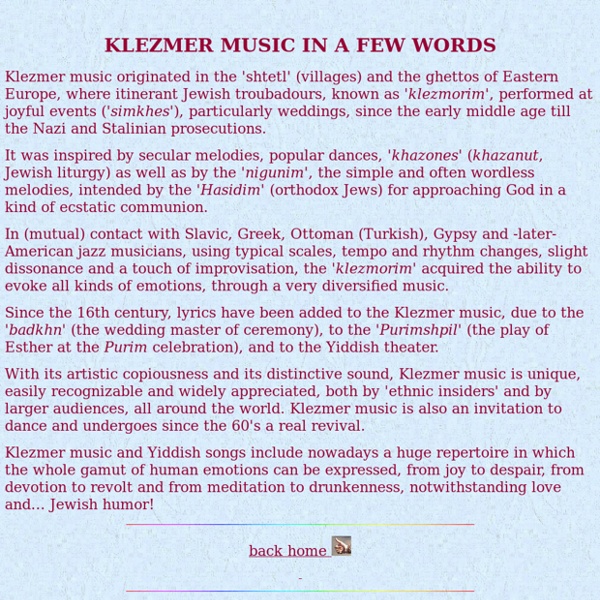Traditional Irish music
Traditional Irish music is a full body experience: the upbeat tempos compel you to dance a jig, clap your hands and join in. And that's what trad music is all about, joining in and having the craic (fun). Knowing your seisúns from your céilís First things first, learn the lingo.
What Instruments Are Played in Klezmer Music?
Klezmer music is a Yiddish folk music that developed during the renaissance in Eastern Europe. The style features mainly acoustic instruments, though modern American takes on the style incorporate drums and vocals into the blueprint, as well. Because of its origins, klezmer is still considered a form of Jewish music, and is frequently heard at Jewish weddings and other functions. Violin The violin sits at the heart of klezmer music. Musicians capitalize on the stringed instrument's highly expressive qualities.
Klezmer fiddle
Klezmer (Yiddish: Klezmer (כליזמר or קלעזמער, pl. כליזמר, כליזמרים, from the Hebrew כלי זמר meaning "vessel of song") is a genre of fiddle music rooted in the medieval shtetl (villages) of Eastern Europe, where wandering Ashkenazi[1] musicians (Klezmorim) played at bar mitzvahs, weddings and holidays (simkhes).[2] ritual of rabbinic Judaism.[3] Influences[edit] Antecedents[edit] Some academic musicologists[4] suggest that ancient Semitic traditions preceded and influenced, along with Tanahk hymns,[5] Greek Pythagorean music. It consisted of a blend of dance tunes, liturgy and meditative chants (nigunim).
What is Klezmer Music? - The Klezmer Fiddle
In short, "Klezmer" is the name now given to the traditional Jewish wedding music, which once flowered for centuries in the Shtetls of Eastern Europe, prior to the virtual destruction of Eastern European Jewish culture in the Holocaust... The actual word "Klezmer" actually is derived from the Yiddish phrase "Vessels of Song" - it therefore refers to the musicians who once played this beautiful music in the lost Shtetls of Eastern Europe. Above all the musical styles which influenced the traditional Klezmer musicians of Eastern Europe, the Romanian influence seems to be the strongest and most enduring. This fact is reflected in the dance forms found throughout the entire surviving Klezmer music repertoire, e.g. Horas, Doinas, and Bulgars etc.
klezmer music
Klezmer music, genre of music derived from and built upon eastern European music in the Jewish tradition. The common usage of the term developed about 1980; historically, a klezmer (plural: klezmorim or klezmers) was a male professional instrumental musician, usually Jewish, who played in a band hired for special occasions in eastern European communities. In the 21st century, klezmer music can be heard wherever Jews have settled. The Yiddish word klezmer derives from two Hebrew roots: klei (“vessel” or “instrument”) and zemer (“song”).
The history and origins of traditional Irish music
Trace the evolution of Irish music. Ireland may produce big names such as U2 and the Script that tour popular music all over the world but we also know how to keep in touch with our traditions. Fleadh Cheoil na hÉireann (the Music Festival of Ireland), the world’s biggest traditional Irish music celebration, still sees over 400,000 attendees each year with dozens of nationalities arriving in Ireland to celebrate our 2,000 year old traditions.
japan
Article MT088 An overview of solo and ensemble development [Introduction] [Aesthetics] [Teaching] [Historical Background] [The Biwa] [The Koto] [The Shakuhachi] [The Shamisen] [Ensemble Music] [Conclusion] [CDs of Japanese Music] [References]
Traditional Music of Japan — Encyclopedia of Japan
Ancient Japanese MusicAlmost nothing is known about music in Japan's prehistory, through the Jomon and Yayoi periods, but there are ritual figures of musicians, suggesting the early importance of music. The late Yayoi period is marked by the building of immense tombs, and there were probably many powerful clans that gradually culminated in the dominance of the Yamato clan. The state that they built used language, religion and legal systems from the Asian continent and resulted in the high development of the imperial court as a political and cultural center in the Nara (645 - 710) and Heian (794 - 1185) periods. Even when the political power of the imperial court declined after this time, the court retained its cultural traditions, many which continue to this day.
Japanese Traditional Music
Traditional Japanese music usually refers to Japan's historical folk music. One of the defining characteristics of traditional Japanese music is its sparse rhythm. Regular chords are also absent. It is impossible for a person to beat time to the music.
Celtic Music Instruments
From the thump of the Bodhrán to the airy rasp of the wooden flute, celtic music is known by its instruments. Here's an introduction to the main players, with links to more information, for players and afficionados. Fiddle
History of Celtic Music - Celtic Rings Ltd
Celtic music is defined as music that originates from the countries of Ireland, Scotland and Wales. The people who live in these locations are known as Celts, which is how the music became known as Celtic music. Celtic music is best described as a type of folk music with a distinctive music and lyrics. And, today Celtic music is played and heard not only in Ireland, Scotland and Wales, but also on a worldwide stage. Celtic music has been traced back to the 1600's and is still a popular musical genre today. Celtic music can be defined also as music of the Celt people and has been around for several centuries.
African music
History It is widely acknowledged that African music has undergone frequent and decisive changes throughout the centuries. What is termed traditional music today is probably very different from African music in former times.



